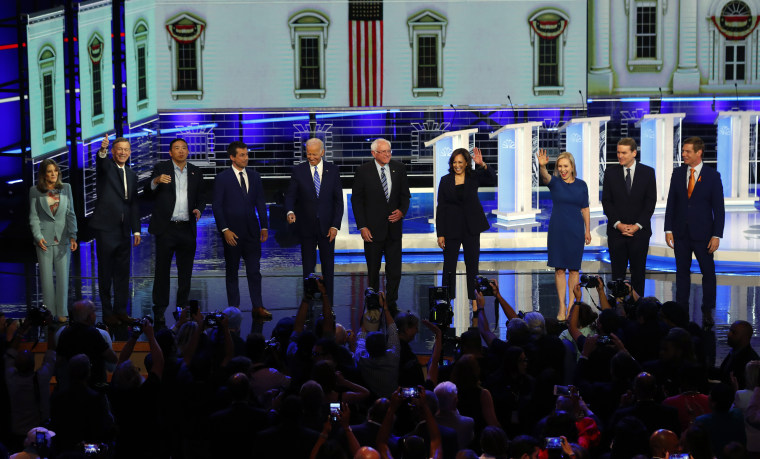For much of 2019, it's been easy to see the Democratic presidential primaries and caucuses as contests on a distant horizon. Everyone realized the party's voters would eventually have their say, but that phase of the process seemed like it would never arrive.
It doesn't seem like that anymore. The Iowa caucuses -- the first nominating contest -- are 90 days from today. The enormous Democratic field is slowly starting to shrink, with two more candidates ending their candidacies in the last two weeks. Iowa's Liberty & Justice Celebration, a party dinner seen as "the last major candidate gathering before the caucuses," has now come and gone.
With developments like these in mind, it's a good time to stop thinking about the nominating contests as something that'll happen eventually and start thinking about them as something that'll happen relatively soon.
And the closer we get to voters casting ballots, the more it's worth paying attention to polling. There's been quite a bit of data released over the last few days, some of which relates to the race for the Democratic nomination, some of which refers to the general election. Let's start with the former, taking a look at the latest national NBC News/Wall Street Journal poll:
1. Joe Biden: 27% (down 4 points from mid-September)2. Elizabeth Warren: 23% (down 2 points)3. Bernie Sanders: 19% (up 5 points)4. Pete Buttigieg: 6% (down one point)5. Amy Klobuchar: 5% (up three points)6. Kamala Harris: 4% (down one point)Every other candidate was at 3% or lower.
The latest Washington Post/ABC News poll of Democratic-leaning registered voters is similar, but not identical.
1. Biden: 28% (down one point since early-September)2. Warren: 23% (up five points)3. Sanders: 17% (down two points)4. Buttigieg: 9% (up five points)Every other candidate was below 3% in this poll.
And then there was the latest national Fox News poll:
1. Biden: 31% (down one point since early-October)2. Warren: 21% (down one point)3. Sanders: 19% (up two points)4. Buttigieg: 7% (up three points)Every other candidate was at or below 3% in this poll.
With this in mind, let's take stock of some of what the latest data is telling us.
* There's no longer any doubt that the top four candidates in these polls constitute the party's top tier. Amy Klobuchar and Kamala Harris can credibly claim second-tier status -- that 5% result for the Minnesota senator stands out -- but they clearly have some work to do.
* None of these results will affect the lineup for the party's November debate. The only other candidate who's close to qualifying is Rep. Tulsi Gabbard (D-Hawaii), who needs one more good poll. Former HUD Secretary Julian Castro, meanwhile, needs four more surveys with 3% support, and with a polling deadline of Nov. 13, his odds of making the cut are not good.
* On a related note, qualifying for the December debate will be even more difficult, but with 4% in the NBC/WSJ poll, Harris has now met the participation threshold. Klobuchar is close, but not quite there.
* I thought there was a very real possibility that Bernie Sanders' recent heart attack, when coupled with concerns about his age (he'll be 79 on Election Day), would weaken his public standing. The latest national polling, however, suggests the Vermont senator's support was largely unaffected by the ailment, and Sanders remains in a very competitive third place.
* I can appreciate the arguments from those who make the case the polling results from early-voting states -- Iowa, New Hampshire, Nevada, and South Carolina -- are what really matter at this stage in the process, and they're absolutely worth paying close attention to, but as Nate Silver noted over the weekend, the national poll leader at this point tends to win his or her party's nomination.
Let's also take a look at hypothetical general-election match-ups, with Election Day 2020 now less than a year away.
NBC News/Wall Street Journal poll:
Biden leads Trump, 50% to 41%Warren leads Trump, 50% to 42%
Fox News poll:
Biden leads Trump, 51% to 39%Sanders leads Trump, 49% to 41%Warren leads Trump, 46% to 41%
Washington Post/ABC News poll:
Biden leads Trump, 56% to 39%Warren leads Trump, 55% to 40%Sanders leads Trump, 55% to 41%Buttigieg leads Trump, 52% to 41%Harris leads Trump, 51% to 42%
These findings will no doubt bolster Team Biden's "electability" talking point, but what stood out for me was the consistency in the Republican's support: Trump was between 39% and 42% in every hypothetical match-up, in every poll.
Trump prevailed in 2016 with 46% of the vote, which as a historical matter, wasn't an impressive showing. Though the incumbent president may have some structural advantages by way of the electoral college -- yes, we've all seen the New York Times/Siena College battleground surveys that created a sense of dread in Democratic politics yesterday -- the likelihood of Trump winning with 42% of the popular vote is poor, and it would require some competitive third-party candidates to further divide the electorate.
